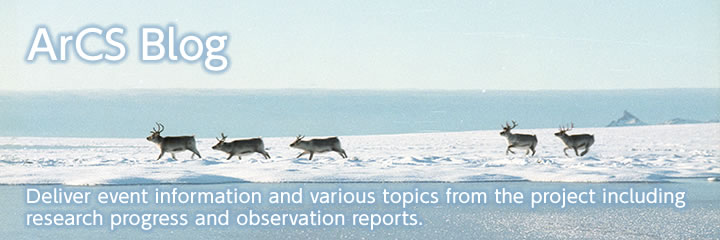The Arctic research project of ArCS will have its sunset on March 2020 after the project duration of five years. One of important objectives was to deliver enough information to policy maker and society in order for Japan to lead the international discussion concerning a sustainable use of the Arctic.

At the end of the project, we had a final assembly to share the research results. Initially, the event was scheduled to be held at the Hitotsubashi hall, but was held online in order to prevent the spread of COVID-19.
The atmosphere is classified into four layers: the troposphere, the stratosphere, mesosphere, and the thermosphere. Weather phenomena (e.g., rainfall, typhoon, and thunderstorm) occur in the troposphere, the bottom layer. The troposphere and the upper layers interact with each other. Also, this interaction from the upper layers to the troposphere is important to forecast the climate. The interaction is called ‘vertical coupling,’ and atmospheric waves have an important role in the interaction. This study focuses on a small-scale atmospheric wave namely gravity wave.
The Arctic Circle is the world's largest dialogue on the Arctic issues, which is consisted by the Assembly (annual meeting) held each October in Reykjavík and the irregular Forums (regional meetings).
Staying at University of Alaska Fairbanks/International Arctic Research Center (UAF/IARC) about a half year, I’ve investigated spatiotemporal variations in sea-ice lead distribution using satellite remote sensing techniques. You can find a short report (written in Japanese) from here.
The 1st Southern Hemisphere Conference on Permafrost (SouthCOP2019) is an international conference of permafrost. It was held in Queenstown, New Zealand for 11 days from December 4 to 14, 2019. Queenstown is surrounded by a rich natural environment and Lake Wakatipu. Before and after the meeting, some field trips were conducted on the surrounding natural environment.
From 27 November to 22 December 2019, I visited the Alfred Wegener Institute (AWI) at Potsdam Germany through the support from the Arctic Challenge for Sustainability (ArCS) Program for Overseas Visits by Young Researchers. During this stay, I assessed the performances of high-resolution models, which are deployed by Arctic-CORDEX team.
I participated in WMMC’19 held in Barcelona, Spain from 7-12 December 2019. During this meeting, I gave a poster presentation and participated in the workshops, oral sessions and speed talks.
On February 14, a symposium to summarize the activities of Theme 7, “People and Community in the Arctic: Possibility of Sustainable Development,” was held at the 21 Komaba Center for Educational Excellence, University of Tokyo.
I’m Takuto Ando, post-doc researcher in Arctic Research Center, Hokkaido University. I stayed in Bremen and studied at marum (Bremen University) in October 2019.




